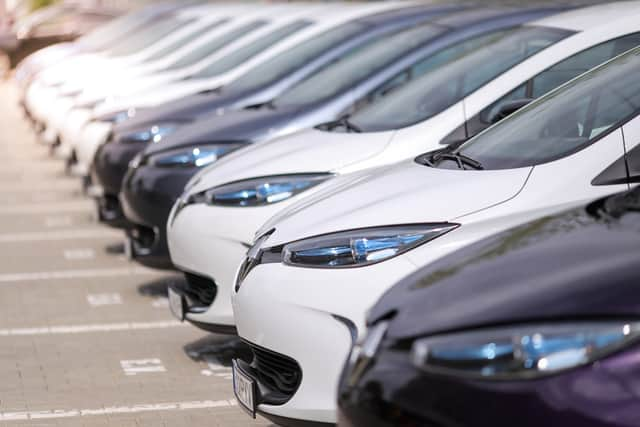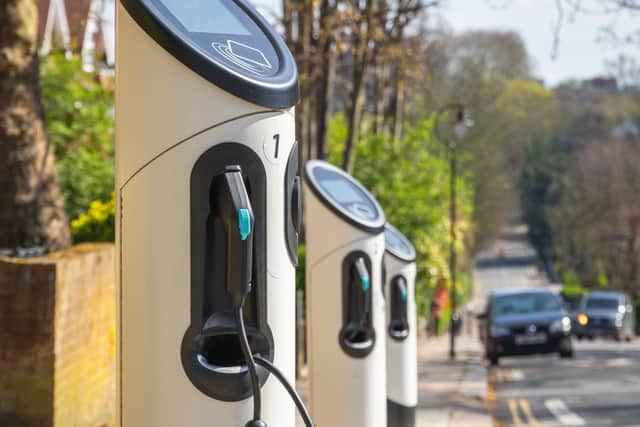Electric car quotas and £620m for chargers under Government’s Net Zero strategy
and live on Freeview channel 276
Car makers will be forced to meet quotas of electric car sales under a zero emissions vehicle mandate announced by the Government.
From 2024 manufacturers will have to ensure a percentage of all models sold in the UK are fully electric, with the proportion increasing as the country nears the 2030 petrol and diesel ban.
Advertisement
Hide AdAdvertisement
Hide AdAt the same time the Government is investing an additional £620 million in charging infrastructure and purchase grants to encourage the uptake of EVs.
The measures form part of the Government’s Net Zero strategy which aims to reduce the country’s net CO2 emissions to zero by 2050.


Announcing a wide ranging package of measures which include building more small nuclear reactors, tree-planting programmes and grants for heat pumps, Prime Minister Boris Johnson said: “With the major climate summit Cop26 just around the corner, our strategy sets the example for other countries to build back greener too as we lead the charge towards global net zero.”
Cutting transport emissions is seen as key to achieving the 2050 target and the new strategy confirmed that the planned 2030 ban on new petrol and diesel cars will go ahead, along with the phasing out of new hybrids by 2035 and combustion engined HGVs by 2040.
Advertisement
Hide AdAdvertisement
Hide AdTo help drive adoption of EVs before then the government intends to set a zero emissions mandate for car makers. It will publish details including targets, "backstop" CO2 regulations and how and when the rules will be enforced in early 2022.
EV sales are rising rapidly, with nearly 33,000 registered in September. However, even with a drop in petrol and diesel sales they still only account for 15% of the new car market.
Industry observers said that grants for buying new cars needed to be maintained but may have to be carefully targeted to help accelerate uptake.
The RAC’s head of policy Nicholas Lyes said: “The growth in the uptake of electric vehicles is impressive, but that doesn’t mean that incentives should stop.
Advertisement
Hide AdAdvertisement
Hide Ad“Making EVs more affordable for the majority of UK drivers – and thus kick-starting mass EV adoption – starts with enough new vehicles being sold in the first place, so continuing the plug-in car grant and ensuring charging infrastructure is the very best it can be are both vitally important.”
Ian Plummer, commercial director of Auto Trader said that grants may have to be more carefully targeted, including the potential of means testing, to make EVs more attractive to less wealthy drivers.
He commented: “Our data shows that interest in electric vehicles is coming almost exclusively from wealthier postcodes. The comparatively high up-front cost of EVs is proving to be a massive barrier for people on average or below average incomes.
“The Government and industry simply has to grasp this nettle if it is to supercharge mass adoption. That might mean introducing some kind of means testing. Incentives are needed to bridge the gap between traditionally fuelled cars and EVs for those who simply cannot afford the ‘green premium’.”
Advertisement
Hide AdAdvertisement
Hide AdThe planned mandate has been welcomed by some who say it will help create a clearer picture of demand for infrastructure.
Tanya Sinclair, policy director for the UK and Ireland at charging network ChargePoint said: “We have seen the positive impacts on EV uptake of these schemes in North America, where they have significantly built up availability and consumer confidence of electric vehicles.


“A UK ZEV mandate will create huge confidence for those operating and investing in the charging industry [which] will for the first time be able to clearly anticipate demand for charging infrastructure and create a clear roadmap to meet these targets.
The extra funding for infrastructure will be focused on improving on-street residential charging for those without private parking and, according to the strategy, grants will be "targeted", suggesting an end to the current universal plug-in car grant.
Advertisement
Hide AdAdvertisement
Hide AdThe UK currently has around 25000 public charging points but the Government’s own findings estimate that between 280,000 and 480,000 are needed to ensure the network can meet demand by 2030. Previous research by the Society of Motor Manufacturers and Traders put the figure at 1.7m.
Patrick Reich, co-founder of EV charging platform Bonnet, commented: “Public charging provision is one of the tallest hurdles to climb before the 2030 ICE ban. Around 40 percent of households don’t have a private driveway, meaning they would rely on public charge points to be able to charge and drive. Investing in this infrastructure is vital, while also making sure charge point providers make it as simple and reliable for drivers to use their service.”
Comment Guidelines
National World encourages reader discussion on our stories. User feedback, insights and back-and-forth exchanges add a rich layer of context to reporting. Please review our Community Guidelines before commenting.
